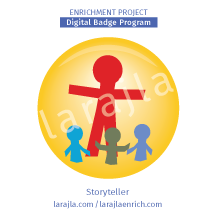 When you are telling stories to others, you need many skills. Telling stories has a long tradition of passing information orally to listeners. Let’s learn about becoming a storyteller.
When you are telling stories to others, you need many skills. Telling stories has a long tradition of passing information orally to listeners. Let’s learn about becoming a storyteller.
Steps
1. Why tell a story?
Stories can be used for a variety of reasons — to inform, teach, entertain or just to keep a story alive. In addition, the types of stories you tell may fall under one of these types:
- Personal journey
- Overcome obstacles
- Fable
- Inspirational story
As you collect stories, keep notes as to the type of story it is and how you want your audience to engage with each story.
2. Keep a list.
As you hear or read stories, keep a list of those you think would be good for adding your unique voice. Do not limit your story list to those you hear live. You can also check out audio books, YouTube videos and more.
NOTE: If you feel more comfortable, you might choose to create a journal or record stories and the presenters.
3. Storytellers.
Find a storytelling group or event in your area and listen to others tell stories. Keep note of what you like / don’t like about their presentations. This will help you craft your own presentation.
NOTE: You can also use TED Talks as a way to experience storytellers.
4. The past.
Before stories were written down, they were kept orally. Look through stories of the past — tales, legends or even mythology. Explore beyond your own culture. If you find any that fit your tastes, add them to your story list.
5. Theme.
You may be asked to tell a story as part of a themed event. Make sure your list has more than just a list of names. Add in genres / types of each story as well as a brief description. Are you limiting yourself to one theme? If so, look to expand your list even further.
6. Review list.
Make sure your list includes a variety of stories. A mix of genres will give you more opportunities to tell your stories. Expand your list into additional areas if you feel you need to add other types of stories.
7. Your audience.
The story you tell is greatly dependent on your audience. You don’t want graphic details for kids, but most adults are fine with them. Keep notes on how to adjust your story for a younger audience or how to add more depth for an older audience.
8. Tell a story.
Learn how to orally tell a story. Read a book, follow a blog, etc. to see how others do it. Look at your list from Step 3 showing what you liked / didn’t like about the presentations you saw. See how others deal with these issues.
9. Join.
Join or start a storytelling group. Review the things you learned, notes you have, stories you’ve enjoyed, etc. How can your storytelling group help you or others?
10. Mentor.
If you’re uncomfortable with a group, find a mentor to help you with your storytelling skills.
11. Props.
Props allow you to have your story told by others or to help set an atmosphere. It also helps your audience if you have multiple characters in your story. Younger audiences love props they can help with such as puppets. Look through your stories and determine which can utilize props.
12. Actions and sounds.
Adding repeatable actions, sounds or phrases allows your audience to participate in your story. It grabs their attention. It gets them motivated. Find a story with these elements or create these in your own story.
13. Storytelling event.
Participate in a storytelling event. Discuss with others how they prepare to minimize stress and stage fright.
14. Track of the past.
Keep track of your past storytelling activities including location, event name, date and ways to improve your performance / story. You may choose to archive your stories as well via audio or video recordings.
Supplements
SUPP_Storyteller_2in_12up_larajla
- Avery 2.5” round label printable, 12 up
SUPP_Storyteller_Checklist_larajla
- Badge checklist
Sites to Explore
- www.storyteller.net
- www.freebooknotes.com/storytelling-guide
- createyourlifestory.com/podcast/difference-life-story-oral-history
- www.ted.com/topics/storytelling
- www.eldrbarry.net/roos/eest.htm
- www.pbslearningmedia.org/resource/echo07.lan.stories.lporaltrad/storytelling-oral-traditions
- www.storytellingday.net/oral-traditions-storytelling-explored.html
- www.aaronshep.com/storytelling/index.html
- www.afsnet.org/?page=FolkloreWiki
- www.storytelling-nyc.org/tips.html
- youtube.com
Get the infographic here > larajla blog post
Get the PDFs of the badge program / supplements here > Full badge PDFs